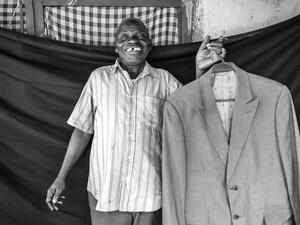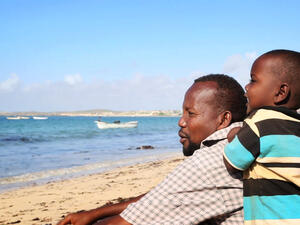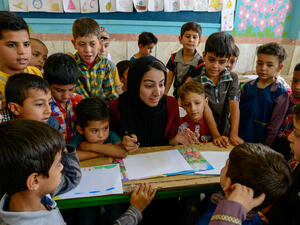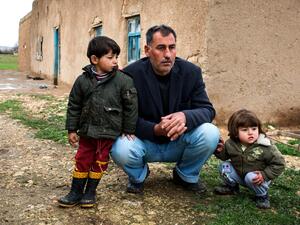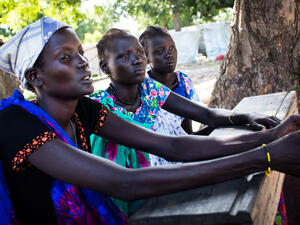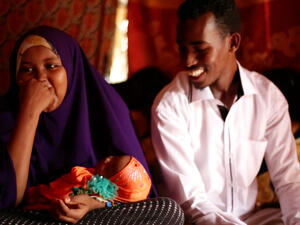Home again, 10 years after Croatia's Operation Storm
Home again, 10 years after Croatia's Operation Storm

The Dragas family is staying with relatives in Gornji Cuntic, central Croatia, while they wait for housing assistance from the government.
GORNJI CUNTIC, Croatia, August 5 (UNHCR) - On August 5, 1995, Croatian armed forces launched a massive offensive, codenamed "Operation Storm", that put an end to the four-year uprising that affected a third of its territory by armed elements from the country's Serb minority.
Making up 12 percent of Croatia's population in the 1990s, many Croatian Serbs had opposed the independence of the young nation as Josip Broz Tito's multi-ethnic Yugoslavia was in the process of dissolution. Backed by the Serb-dominated Yugoslav Federal Army and paramilitary forces, in 1991 Croatia's Serbs carved out large, predominantly Serb-populated portions of this former Yugoslav republic, putting it under their control during a six-month war. By the end of 1991, an estimated 500,000 Croats and other non-Serbs were expelled from parts of Croatia overrun by Serb forces.
The 1995 "Operation Storm" conducted by the Croatian military brought not only a reversal of fortune on the battlefield, but also prompted another wave of displacement - this time in the opposite direction. Some 250,000 Croatian Serbs fled the country and found refuge in the Federal Republic of Yugoslavia (now Serbia and Montenegro) and in the Serb-controlled part of Bosnia and Herzegovina.
Among them was the then 12-year-old Gordana who, together with her parents, left the village of Gornji Cuntic, near the town of Petrinja in central Croatia.
Ten years later, Gordana is back in Gornji Cuntic. After spending a decade in exile in Serbia - during which she married Zoran Dragas, also a refugee from Gornji Cuntic, and gave birth to Nikola, now three - she and her husband decided to return to Croatia. Recalling the decision, she says, "One day, Zoran said: 'I was born in Croatia, I want to go back home'."
And so they did. On June 15 this year, the Dragas family and nine other families embarked on the 400th return convoy since UNHCR started its organized voluntary repatriation operation to Croatia in 1996.
In coordination with Croatian authorities, the UN refugee agency has assisted the return of over 18,000 refugees from Serbia and Montenegro and over 7,500 from Bosnia and Herzegovina in the last 10 years. The Croatian government estimates that another 107,000 refugees returned to Croatia on their own. The rest of the approximately 250,000 people who fled Croatia in 1995 have either integrated locally in the neighbouring countries, or are still considering repatriation to their homeland.
In addition, 240,000 internally displaced persons, mostly of Croat ethnicity, have returned to their places of origin since 1995.
For now, the Dragas family - including a newborn baby girl - are living with four elderly relatives in Gordana's grandmother's small and shabby hut while they wait for a positive decision by the Croatian government on assistance to build their own house. The Croatian Red Cross, UNHCR's key implementing partner in the field of humanitarian assistance to returnees, has provided two beds. "That's all they could give us," she says.
Among the obstacles to return, high unemployment in Croatia, especially in its war-torn areas, seems to be the biggest problem. For the moment, the Dragas have no income. Gordana, who is trained in dairy processing, recalls their unstable life in exile: "Here and there we worked for wages, but never had real jobs. That was one of the main reasons for us to come back."
However, the situation in their area of return is not much better. "My husband, who is a car mechanic, is helping out with some forestry work. It's very hard. I don't know how we'll do." But she remains optimistic: "We know that every beginning is difficult. We hope for government assistance to build our house and, little by little, we'll manage."
Even though they were aware that Croatia was not the land of milk and honey and that they could not expect their living conditions to improve immediately, she and her husband do not regret their decision. "The longing to return home was simply stronger. Here, we are on our own."
Returnees also face problems with their property rights. According to Croatian government statistics, 385 housing units, mostly occupied by former Croat refugees from Bosnia and Herzegovina, are still to be returned to their rightful owners. In addition, many Croatian Serbs, especially those who used to live in urban areas, cannot return because they have lost their tenancy rights to socially-owned apartments.
In 2004, the government introduced an ambitious plan to provide housing care to this specific group of refugees, but no single positive decision has been taken in favour of the potential beneficiaries thus far. UNHCR has changed its role of providing humanitarian assistance to the country's refugees and displaced people during the armed conflict in the early 1990s. It now focuses its activities on securing, through its implementing partners and local non-governmental organisations, free legal aid to returnees to help them get access to their rights.
The overall security situation in the areas of return is satisfactory and inter-ethnic incidents and attacks against Serb returnees remain isolated. UNHCR recently condemned such an incident when two elderly returnees were assaulted in the village of Ostrovice, in the hinterland of the coastal city of Zadar.
For Gordana, security is not a problem. "All our Croat friends whom we went to school with, even after 10 years - not a day passes without one of them stopping by our house to see how we are." The family also had no problems with obtaining Croatian documents, she adds.
Almost a decade after the end of hostilities in South-eastern Europe, the governments of Croatia, Bosnia and Herzegovina, and Serbia and Montenegro committed themselves to the so-called Sarajevo Declaration of 31 January 2005 to resolve all outstanding problems related to displacement in the region by the end of 2006. On numerous occasions, Croatia's key political figures, including President Stjepan Mesic and Prime Minister Ivo Sanader, have invited refugees from neighbouring countries to return to their Croatian homeland. For the family of Gordana and Zoran Dragas, the decade-long journey from exile back to their homeland is, hopefully, over.
By Neven Crvenkovic
UNHCR Zagreb


